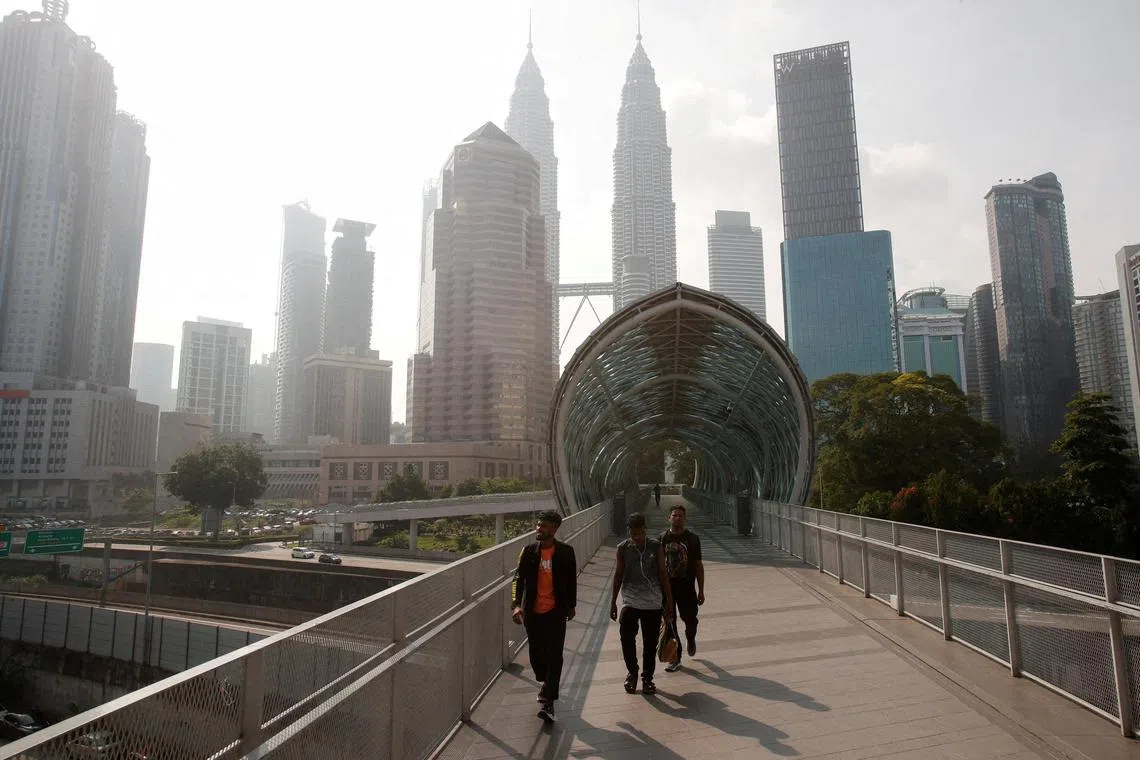Malaysians urged to hydrate, stay indoors to limit exposure to haze
Sign up now: Get insights on the biggest stories in Malaysia

People are also advised to consume at least eight glasses of water a day to maintain the body’s hydration level.
PHOTO: REUTERS
Follow topic:
PETALING JAYA – Malaysians are urged to take safety measures following the resurgence of haze pollution
Those in areas recording unhealthy air quality, which is between 101 and 200 on the Air Pollution Index (API), are advised by the Malaysian Health Ministry to take preventive measures, such as reducing time spent outdoors and avoiding activities such as smoking that can increase air pollution indoors.
Windows and doors should be closed to keep haze away while face masks should be worn outdoors, said the ministry in a haze advisory posted on its social media on Wednesday.
People are also advised to consume at least eight glasses of water a day to maintain the body’s hydration level, while beverages that promote fluid loss such as alcohol and coffee should be avoided.
When driving, the public is advised to use air-conditioning and to select their cars’ air recirculation mode.
“Using air purifiers to help improve the air quality at home is also advisable, while those who are unwell are urged to seek medical treatment,” said the ministry.
“The effects due to continuous exposure to haze include itching in the throat, coughing, shortness of breath, difficulty breathing as well as watery or sore eyes. Other symptoms include runny nose, frequent sneezing, itchy skin and chest pain. Get treatment and advice from a doctor at a nearby clinic if you have these signs and symptoms.”
A consultant respiratory and internal medicine physician at Sunway Medical Centre, Dr Kow Ken Siong, said fine particulate matter in the haze less than 2.5 microns in diameter could leave a lasting impact, especially when inhaled.
Short-term exposure could result in acute bronchitis symptoms such as cough, phlegm, chest tightness, breathlessness and lethargy, he said.
“Vulnerable groups such as children, the elderly and those with pre-existing conditions like asthma and cardiovascular diseases face higher risks where repeated exposure to haze over several years can worsen pre-existing chronic lung conditions, increase the risk of lung cancer and lead to frequent bronchitis episodes.
“Individuals without prior health issues may also develop upper respiratory symptoms and become more susceptible to viral infections,” he said.
Dr Kow recommended tips such as staying indoors as much as possible, especially in areas where the API is unhealthy.
“Also, keep doors and windows closed to prevent indoor air pollution,” he said.
“Incorporate high-quality air purifiers with Hepa (high efficiency particulate air) filters, which can help mitigate risks, as indoor air quality can be impacted by haze, especially when natural ventilation is limited.”
Dr Kow also recommended using N95 masks for prolonged outdoor exposure, which may help filter out fine particulate matter that may be harmful.
He said staying hydrated throughout the day is also important, besides staying informed and seeking medical advice.
He also encouraged Malaysians to monitor air quality through official sources, limit outdoor activities during the haze and seek professional medical advice if experiencing lung or heart symptoms.
“Self-medication, particularly with inhalers, is discouraged as it may lead to unwanted side effects.
“The impact of haze pollution on respiratory health is a significant concern in Malaysia.
“By understanding the health risks and adopting preventive measures, Malaysians can better protect themselves and their loved ones during periods of poor air quality,” he said.
Five areas recorded unhealthy API readings as at 9am on Thursday, with Bukit Rambai in Melaka being the worst affected area with an API reading of 153.
Based on the API recorded by the Department of Environment, other areas with an unhealthy API measurement of above 100 are Melaka city (146), Port Dickson in Negeri Sembilan (109) and Batu Pahat (134) as well as Tangkak (116) in Johor. THE STAR/ASIA NEWS NETWORK

